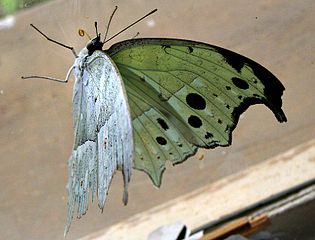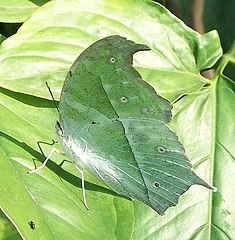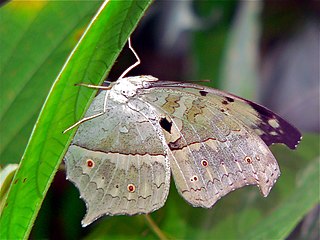
The Scotch argus is a butterfly of the family Nymphalidae. In spite of its English name argus, it is not a close relation of the brown argus nor the northern brown argus.

Erebia ligea, the Arran brown, is a member of the subfamily Satyrinae of the family Nymphalidae. This brown is widespread in south-eastern and northern Europe. It prefers mixed woodlands at low altitudes. It is rarely seen in open areas. This species was first described by Carl Linnaeus in his 1758 10th edition of Systema Naturae, and the type locality is Sweden.

Junoniini is a tribe of nymphalid (brush-footed) butterflies.
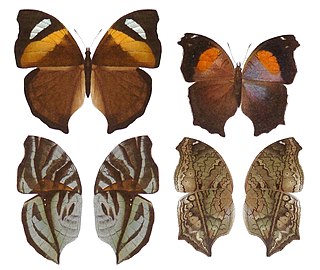
Salamis is a genus of nymphalid butterflies. They are commonly known as mother-of-pearls and are found in Africa. Salamis was a nymph in Greek mythology, the daughter of the river god Asopus and Metope, daughter of the Ladon, another river god.
Bicyclus ena, the grizzled bush brown, is a butterfly of the family Nymphalidae. It is found from KwaZulu-Natal to Eswatini, Mpumalanga, from Zimbabwe to Kenya and in Uganda.

Tagiades flesus, the clouded flat, clouded forester or clouded skipper, is a butterfly of the family Hesperiidae from southern Africa.

Sevenia boisduvali, the Boisduval's tree nymph, is a butterfly in the family Nymphalidae. There are four subspecies; all native to Africa.
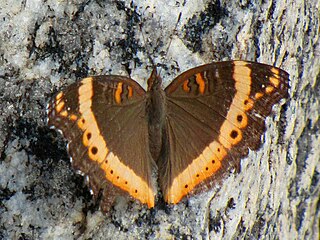
Precis archesia, the garden inspector or garden commodore, is a species of butterfly in the family Nymphalidae, native to Subsaharan Africa.
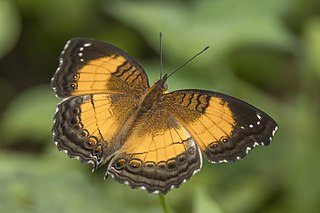
Junonia terea, the soldier pansy or soldier commodore, is a butterfly of the family Nymphalidae. The species was first described by Dru Drury in 1773. It is found in the Afrotropical realm.
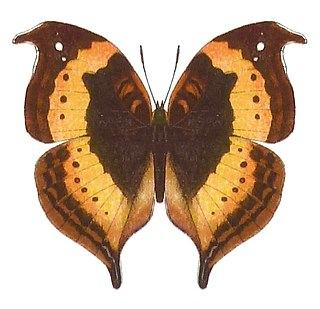
Precis tugela, the African leaf butterfly or eared commodore, is a butterfly of the family Nymphalidae. It is found in eastern and southern Africa, ranging from Ethiopia to South Africa. It is commonly included in the genus Junonia rather than Precis.

Protogoniomorpha anacardii, the clouded mother-of-pearl, is a species of Nymphalidae butterfly found in tropical Africa, and in Arabia
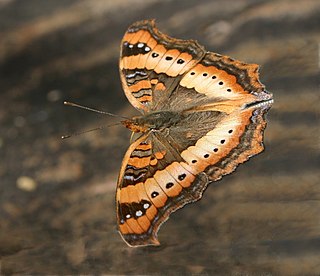
Precis ceryne, the marsh commodore, is a species of butterfly in the family Nymphalidae, native to Subsaharan Africa.

Protogoniomorpha is a genus of nymphalid butterflies found in the Afrotropical realm, commonly known as mother-of-pearls.

Charaxes phaeus, the demon emperor or dusky charaxes, is a butterfly of the family Nymphalidae. It is found in southern Africa.

Charaxes varanes, the pearl emperor, Karkloof emperor, or pearl charaxes, is a butterfly of the family Nymphalidae, found in Africa from Saudi Arabia to South Africa.
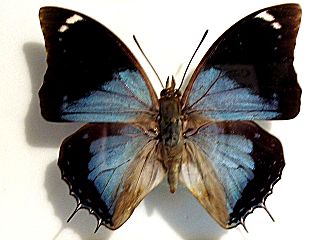
Charaxes bohemani, the large blue emperor, large blue charaxes or divebomber charaxes, is a butterfly of the family Nymphalidae. It is found in eastern and southern Africa.
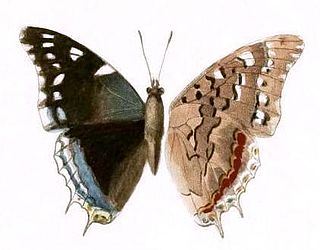
Charaxes guderiana, the blue-spangled emperor, Guderian's charaxes or blue-spangled charaxes, is a butterfly of the family Nymphalidae. It is found in southern Africa.
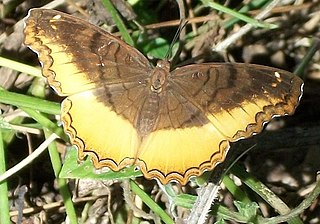
Eurytela dryope, the golden piper, is a butterfly of the family Nymphalidae, found in Sub-Saharan Africa, the Arabian peninsula and Madagascar.
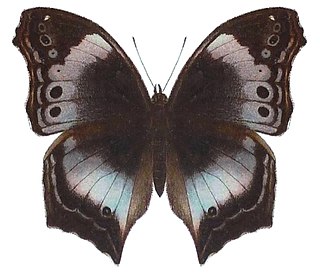
Protogoniomorpha cytora, the western blue beauty, is a butterfly in the family Nymphalidae. It is found in Guinea, Sierra Leone, Liberia, Ivory Coast, Ghana, Togo, and Benin. The habitat consists of open spaces in primary forests and mature secondary forests.

Protogoniomorpha temora, the blue mother-of-pearl or eastern blue beauty, is a butterfly in the family Nymphalidae. It is found in Nigeria, Cameroon, the Republic of the Congo, Angola, the Central African Republic, the Democratic Republic of the Congo, Uganda, Tanzania, Kenya, Sudan and Ethiopia. The habitat consists of dense forests and riverine thicket.




